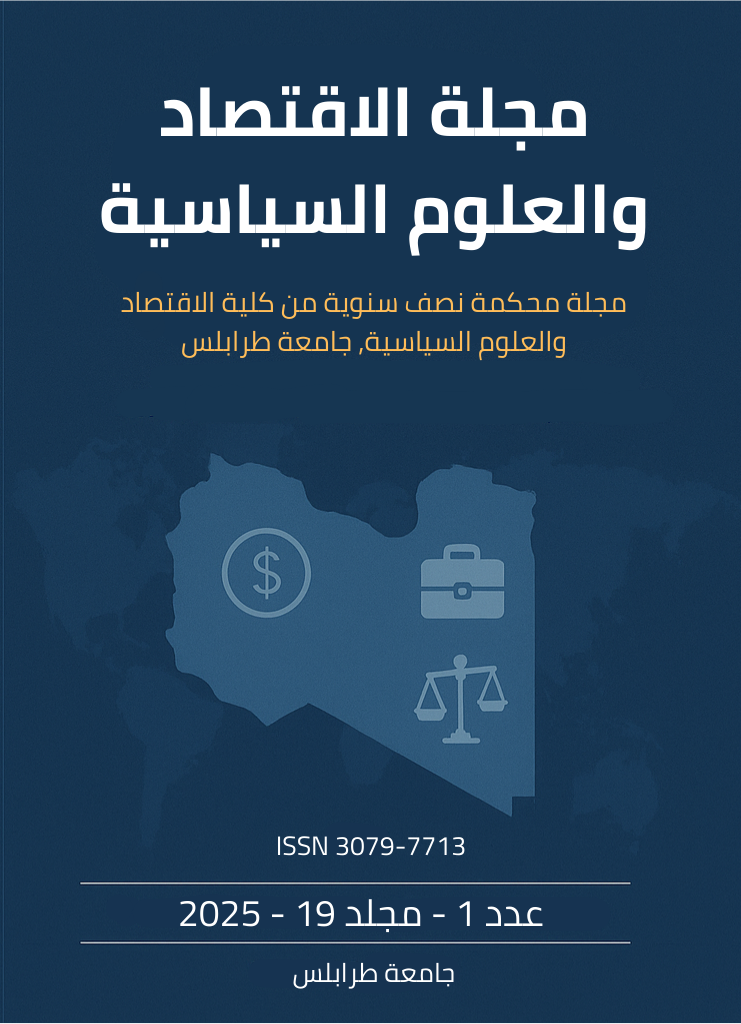Analyzing the Efficiency of Libya’s Agricultural Sector for Growth and Sustainability: A DEA-Based Study to Identify Inefficiencies and Improvement Opportunities
Keywords:
Agricultural efficiency, data envelopment analysis, Tobit model, agricultural investment, natural resourcesAbstract
This study aims to analyze the efficiency of Libya’s agricultural sector using Data Envelopment Analysis (DEA) while identifying the factors influencing efficiency through the Tobit model. Time series data for the period 2002-2022 were analyzed to assess the performance of the agricultural sector in light of Libya’s economic and political transformations. The DEA results revealed significant variations in technical efficiency levels across different economic periods. The period of stability and relative growth (2002-2010) recorded the highest efficiency levels, driven by increased government spending and an improved agricultural investment environment. In contrast, the period of instability and turmoil (2011-2016) witnessed a sharp decline in efficiency due to the collapse of state institutions, reduced agricultural support, and weakened investments. Meanwhile, the period of partial recovery (2017-2022) showed slight improvements in efficiency but remained below the desired level, reflecting persistent challenges in resource allocation and weak agricultural policies.The results also highlighted the impact of fluctuations in agricultural investment, availability of natural resources, agricultural labor, and technology levels on production efficiency. Through the Tobit model, it was found that agricultural labor, agricultural investment, water availability, and corruption levels negatively affected efficiency, indicating structural challenges in resource allocation and inefficiencies in agricultural policies. Conversely, the level of agricultural technology was found to have no significant impact, emphasizing the need to enhance the utilization of modern technologies and promote agricultural innovation.
Based on these findings, the study recommends restructuring government support, improving agricultural resource management policies, combating corruption, fostering effective investments in agricultural technology, and developing training programs for agricultural labor. Implementing these recommendations would contribute to achieving agricultural sustainability, enhancing food security, and improving the efficiency of Libya’s agricultural sector in the face of economic and climatic challenges.

Downloads
Published
How to Cite
Issue
Section
License
Copyright (c) 2025 Journal of Economics and Political Sciences

This work is licensed under a Creative Commons Attribution 4.0 International License.
- The researcher must submit a commitment (according to the provided form) confirming that the scientific work submitted for publication in the journal has not been previously published in any form, is not under consideration for publication by any other entity, and is not a summary of any previously published work.
- All scientific work submitted for publication in the journal will be subjected to an approved software program to detect any violations of intellectual property laws (plagiarism) to ensure its academic integrity.
- In case of any violations of intellectual property laws, the scientific work will be permanently rejected for publication in the journal.
- The scientific work must be submitted in three printed copies (A4 size), along with one copy on a CD in Word format under the Windows operating system.
- The editorial board has the right to perform an initial review of the submitted scientific work to assess its suitability for peer review or to reject it.
- The editorial board has the right to request any documents deemed necessary to complete the initial review or peer review process, such as but not limited to: (statistical data analysis forms, questionnaires filled by respondents, reports, etc.).
- The researcher must complete the journal’s submission form, which includes necessary contact information.
- The period for submitting scientific work by researchers is as stated in the announcement for accepting submissions for publication in the journal.
- Submissions for publication can be delivered in person or via the journal's email.
- Priority will be given to applied scientific work (practical research), especially work that addresses current issues relevant to Libya.
- The arrangement of scientific works for publication in the journal will depend on technical considerations determined by the editorial board.
- The views expressed in the scientific work are those of the authors only and do not necessarily represent the views of the journal.
Accepted 2025-04-19
Published 2025-05-27











